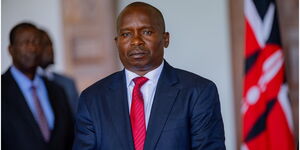President William Ruto’s administration on Thursday, February 8, announced that it was seeking a yen-dominated bond worth Ksh80 billion.
In a statement, Treasury Principal Secretary Chris Kiptoo stated that the country had signed a Memorandum of Understanding (MoU) with Nippon Export and Investment Insurance (NEXI) for the issuance of a Samurai Bond.
Flanked by NEXI Chief Executive Officer Atsuo Kuroda in Tokyo, Japan, Kiptoo announced that the Samurai Bond would be agreed upon by the National Treasury and NEXI.
A Samurai Bond is a yen-denominated bond issued in Tokyo by a non-Japanese company and subject to Japanese regulations.
The Yen-backed bond was announced a day after Kenya started the process of buying back the dollar-dominated Ksh321 billion Eurobond.
“This agreement (MoU) enables Kenya to issue a Samurai Bond totalling USD500 million (Ksh80 billion) in two phases of USD 250 each,” Kiptoo announced.
The money will be used to support e-mobility initiatives, including promoting electric vehicles (EVs) and enhancing energy efficiency in Kenya's transmission network.
Justifying the Samurai Bond, the National Treasury remarked that the upgrading of transformers would reduce energy losses in Kenya’s transmission network.
“The bond will be utilized during the 2024/2025 Financial Year and is expected to conclude by June 2024,” the National Treasury explained.
Speaking after the signing of the MoU, President William Ruto noted that the Samurai Bond would strengthen ties for industrial development and green growth as well as promote Japanese companies in Kenya.
President William Ruto is on a three-day visit to Japan where he has secured funding for multibillion projects.
This includes the Ksh15 billion Meru Wind Farm Energy, Ksh8 billion Isiolo Solar Energy and Ksh800 million Thika Vehicle Manufacturers projects.
The President has also received Ksh75 billion in funding for the Menengai Geothermal plan and electrified vehicles promotion.












